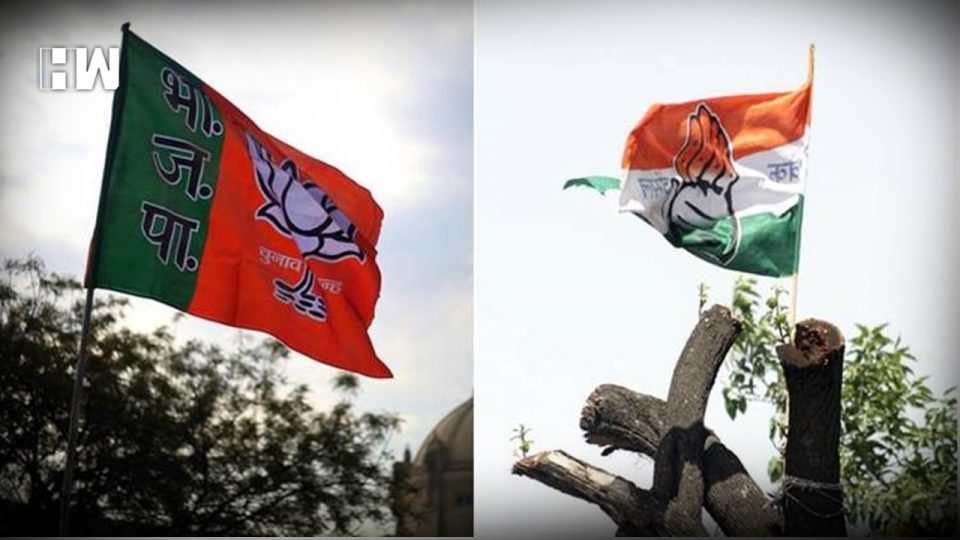The assembly elections in Madhya Pradesh have been largely a fight between the Congress and the BJP for decades, but quite a few other political outfits are gearing up to enter the poll arena to take on the Big Two.
Outfits like the Mayawati-led Bahujan Samaj Party (BSP), the Samajwadi Party (SP), the Aam Aadmi Party (AAP), the Gondwana Ganatantra Party (GPP) and the newly floated SAPAKS Samaj, among others, are getting ready to throw their hats in the poll ring.
Madhya Pradesh, which has a 230-member assembly, is scheduled to go to the polls by the year-end.
The Congress, in opposition since 2003, has named its veteran leader and former Union minister Kamal Nath as the new state president as part of its efforts to strengthen the party and dislodge the BJP from power.
The BJP, too, has made changes in its organisation ahead of the polls. The party has appointed Rakesh Singh, the Lok Sabha MP from Jabalpur who has vast organisational experience, as its state unit chief.
The AAP has already sounded the poll bugle by announcing 39 candidates way ahead of the polls, stealing a march over others, at least in selection of contestants.
The Delhi-based party has said it will contest all the 230 seats. AAP convenor and Delhi Chief Minister Arvind Kejriwal is scheduled to address a meeting at Indore on July 15, singling start of its campaign.
Besides, a rebel group of the Janata Dal (U), led by former Union minister Sharad Yadav, is working on stitching a broad alliance with parties like the GGP, which has pockets of influence in tribal areas, and its breakaway faction, the Bharatiya Gondwana Party (BGP).
The Samanya Pichhada Evam Alpsankhyak Varg Samaj (General, Backward and Minority Welfare Society), better known as SAPAKS Samaj, an organisation born out of opposition to the governments reservation policy in jobs, promotion and education, has also decided to contest all the 230 seats.
However, the BJP sees no threat from these smaller parties to its quest to retain power in the state and in fact thinks their presence will benefit it.
“Politics in Madhya Pradesh is largely confined to two major parties, the BJP and the Congress. Their (smaller parties) presence will benefit the BJP as they will divide the votes of the main opposition party (Congress),” state BJP spokesman Rajnish Agrawal told PTI.
“If the Congress goes with the BSP, it will benefit the latter and not the former. All of them will cut into the votes of the Congress and their presence will prove to be advantageous for the BJP,” he said.
The Congress is looking for an alliance with like- minded parties to prevent a split in votes and stop the BJP’s victory march.
State Congress spokesman Pankaj Chaturvedi said, Though politics in Madhya Pradesh is bi-polar in nature, the Congress may have a truck with the like-minded parties like the BSP and the SP to prevent a split of votes, especially of SCs/STs and backward classes.”
“A decision on alliance will be taken by top leaders of parties concerned and once modalities are finalised, it will be announced,” he said.
However, in the middle of June, the BSP had said it was not in talks with the Congress for an alliance in MP.
On the presence of AAP and SAPAKS Samaj, Chaturvedi said they will not have any impact on the poll outcome.
“We have already announced 39 candidates. We will declare more names in phases and contest all the 230 seats in the state,” AAP MP convenor Alok Agrawal said.
The AAP is contesting assembly polls in Madhya Pradesh for the first time.
“The SAPAKS Samaj has decided to contest all the 230 seats in the year-end assembly polls,” Hiralal Trivedi, SAPAKS Samaj patron and a retired IAS officer, had said last month.
In the undivided Madhya Pradesh (which had 320 seats), the BSP had won 11 assembly seats in 1998.
The party won just four seats in the last elections in 2013, but the Dalit outfit remains a major force in areas bordering Uttar Pradesh, a Congress leader said.
In the last assembly polls, the BJP had won 165 seats, while the Congress bagged 58. Their vote share was 44.48 per cent and 36.38 per cent, respectively.
The BSP, the SP and the GGP had notched up 6.29 per cent, 1.25 per cent and 1 per cent vote share, respectively.
As an independent media platform, we do not take advertisements from governments and corporate houses. It is you, our readers, who have supported us on our journey to do honest and unbiased journalism. Please contribute, so that we can continue to do the same in future.


Maharashtra Minister Abdul Sattar In Hot Water After Derogatory Comment Against MP Supriya Sule